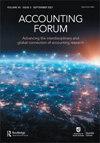个人、社会和人口因素对中国审计师接受不道德业务意愿的影响
IF 3.4
4区 管理学
Q2 BUSINESS, FINANCE
引用次数: 1
摘要
摘要:本研究旨在探讨个人和社会因素对中国审计师在面临道德困境时接受不道德约定意愿的影响。本文采用理性行为理论作为研究的理论基础。个人因素(即伦理意识)和社会因素(即中国人的人际关系,称为“关系”)被纳入TRA模型,以检验审计师的意图。本研究采用调查方法。来自中国多个城市的306名审计师的样本结果表明,审计师的理想主义与他们对拒绝可疑审计项目的态度呈正相关;相反,相对主义与他们对拒绝有问题的约定的态度呈负相关。此外,审计师的关系取向(即寻求帮助和寻租)与主观规范呈负相关,这表明审计师意识到他们与客户的密切个人关系可能与同事或主管的期望相冲突。在进一步的测试中,本研究控制了性别和地区对审计师道德意愿的影响。结果表明,女性审计师可能比男性审计师对道德问题更敏感,中国南方审计师在面对道德困境时可能采取更独立和公平的视角。研究结果可以帮助管理者更好地了解影响员工道德推理的个人和社会因素,并采取适当的措施来增强审计师的道德意图。本文章由计算机程序翻译,如有差异,请以英文原文为准。
The relationships of personal, social and demographic factors on Chinese auditors’ intentions to accept unethical engagements
ABSTRACT This study aims to investigate the personal and social influences on Chinese auditors’ intentions to accept unethical engagements when faced with ethical dilemmas. The theory of reasoned action (TRA) is employed as the theoretical basis for the investigation. Personal factors (i.e. ethical ideologies) and social factors (i.e. Chinese interpersonal relationships, termed guanxi) are included in the TRA model to examine auditors’ intentions. A survey methodology is utilised in this study. The results from a sample of 306 auditors from several cities in China show that auditors’ idealism is positively associated with their attitudes towards the rejection of questionable engagements; conversely, relativism is negatively associated with their attitudes towards the rejection of questionable engagements. In addition, auditors’ guanxi orientations (i.e. favour-seeking and rent-seeking) are negatively associated with subjective norms, which suggests that auditors are aware that their close personal relationships with clients could be in conflict with their colleagues’ or supervisors’ expectations. In the further tests, this study controls for the effects of gender and region on auditors’ ethical intentions. The results indicate that female auditors may be more sensitive to ethical issues than male auditors, and auditors in southern China might adopt a more independent and fair perspective when confronted with ethical dilemmas. The findings can help managers better understand personal and social factors that influence their employees’ moral reasoning and adopt proper measures to enhance auditors’ ethical intentions.
求助全文
通过发布文献求助,成功后即可免费获取论文全文。
去求助
来源期刊

Accounting Forum
BUSINESS, FINANCE-
CiteScore
5.20
自引率
6.50%
发文量
0
期刊介绍:
Accounting Forum publishes authoritative yet accessible articles which advance our knowledge of theory and practice in all areas of accounting, business finance and related subjects. The journal both promotes greater understanding of the role of business in the global environment, and provides a forum for the intellectual exchange of academic research in business fields, particularly in the accounting profession. Covering a range of topical issues in accounting, business finance and related fields, Accounting Forum''s main areas of interest are: accounting theory; auditing; financial accounting; finance and accounting education; management accounting; small business; social and environmental accounting; and taxation. Of equal interest to practitioners, academics, and students, each issue of the journal includes peer-reviewed articles, notes and comments section.
 求助内容:
求助内容: 应助结果提醒方式:
应助结果提醒方式:


